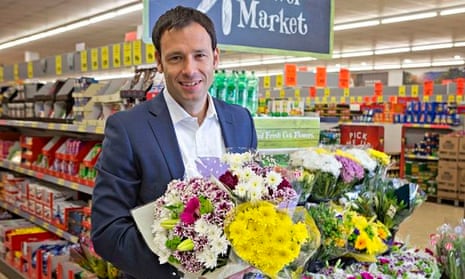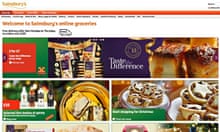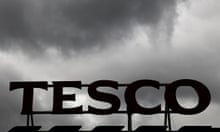‘I like the idea of pushing the boundaries,” says Ronny Gottschlich, the 40-year-old managing director of the UK arm of Lidl. But the German discounter is not just testing out a few new shopping ideas: together with compatriot chain Aldi it is changing the way we shop and threatening to end the big supermarkets’ stranglehold on Britain’s £175bn-a-year grocery market.
Figures out this week showed takings through the Lidl tills over the last three months are up 18% on last year. Tesco, Asda, Sainsbury’s and Morrisons, meanwhile, have all seen sales suffer as shoppers realise they can buy very similar products at far lower prices in the discounters’ aisles.
At this time of the year discount store shoppers have traditionally traded up to the main chains to treat themselves to more expensive food: but in 2013 that pattern changed. Tesco and Morrisons in particular took a hammering last Christmas as customers decided there was little to be gained, other than a lighter wallet. Gottschlich thinks the same is happening this year.
Sales at established Lidl stores, he says, were up by about 20% in the first week of December. “We have an increasing number of shoppers coming through our doors and they are going to keep doing exactly the same thing to do their Christmas shopping with us.” The number of Lidl visits in early December was up 12%-15% and each time customers spent an average 8% more.
The 612-store chain, which is expected to hit sales of £4bn this year – up from £3.3bn in 2013 – has already sold 413,000 bottles of its cut price champagne, twice as many as last Christmas. Double the number of lobsters have flown out of the freezers, while sales of sliced smoked reindeer meat are also going well with 7,000 boxes going through the checkouts so far.
Such delicacies are designed to grab attention and persuade more middle-class shoppers to pop in and give the store a try. And it appears to be working, with nearly a quarter of Lidl’s shoppers coming from the wealthier demographics – a couple of percentage points higher than last year.
But as Gottschlich points out, most growth is coming from everyday items such as fresh fruit and vegetables and from people just buying more of their weekly goods in Lidl rather than just nipping in for a few items – what grocery executives call a “top-up shop”.“People are doing more and more of their weekly shop with us,” he says.
Morrisons boss Dalton Philips reckons that unless the big supermarkets cut prices and accept lower profits, the rout of the big four will continue – and that the £8 of every £100 spent on UK groceries that goes to Lidl and Aldi will soon become £25.
He sees their arrival on the supermarket scene as similar to the emergence of low-cost airlines in the 1990s. Now nearly 50% of UK air passengers choose the no-frills operators “because the legacy airlines don’t react fast enough”.
Gottschlich, who grew up in East Germany, credits Lidl’s runaway growth to a sustained effort to become much more British – stocking more fresh fruit, vegetables and meat from Britain and introducing bakeries and more chilled foods which cater to UK tastes.
He said perceptions of the company have changed not just because it has adapted its product range, but because it has made a big effort to explain that by stocking a limited number of items in very similar stores it is able to work extremely efficiently and keep prices low. “One thing people have realised is that with too much choice, someone is charging you for that ... We have let people know there isn’t anything happening behind the scenes we couldn’t explain. We are just a simply organised business trying to save on all the things the customer can’t eat or taste.”
Aldi is growing even faster than Lidl and expanding the range of products it sells – from 900 to more than 2,500 in the past few years – but Gottschlich says his business will stick to its tight selection of 1,550-1,650 products because that is the best way to keep prices low. The big four, stock 30,000-40,000 lines.
Gottschlich’s aim is to continually tweak the Lidl range, depending on the time of year and consumer trends, so shoppers gradually increase the proportion of their weekly shop they buy in Lidl.
“We were previously known as a price-aggressive German discounter and we are becoming known for fresh food and quality. We are now a British family supermarket,” he insisted.
Others may challenge that assertion and not all the reviews of its foods are flattering, but the idea of the privately owned German business as a British consumer champion has sufficiently taken hold to enable Lidl to launch an inventive marketing campaign, using customer recommendations picked from Twitter. Its Christmas TV ad, only its second in the UK, is based around a free Christmas dinner for locals in Hertfordshire who ponder whether the food is from Marks & Spencer or Waitrose before being told they’ve be dining on Lidl.
The same idea is behind a pop-up restaurant in London’s trendy Brick Lane this month where a Michelin-starred chef has created a menu based on Lidl ingredients. Diners only find that out when they get the bill. The hope is that local trendies will be so impressed they’ll take to social media to talk about it and help to raise Lidl’s profile further.
Clearly the social media-led campaign has gained some traction because Gottschlich has dumped Lidl’s traditional house-to-house promotional leaflet drop without any negative impact on sales. The flyers, he says, are not coming back.
It was a change in tactics viewed as controversial at the head office of the Schwarz Group – Lidl’s parent group – in Neckarsulm, south west Germany: “Quite a few people from the international headquarters asked whether we had done the right thing,” says Gottschlich. “We started the campaign at the start of September and the feedback, if you look at Twitter and Facebook, has been incredibly positive. It’s going to continue, as we really believe that the strongest voice and advocate for us is our customers.”
But holding on to those new Lidl customers in the year ahead may not be easy. The battle with the big four has been going Lidl’s and Aldi’s way in the past two years. Lidl is aiming to open up to 50 new stores a year and Gottschlich says he gets up to 50 emails a week from people asking Lidl to open in their town. But new sites are not easy to find and the big four supermarkets are beginning to get their fightback organised.
Asda, Morrisons, Tesco and Sainsbury’s have all cut prices on basics such as bread, milk and eggs to make themselves more competitive with the discounters while Morrisons has launched a loyalty card that claims to match the discounters on price.
Next year Tesco is widely expected to use its position as Britain’s biggest grocer – despite its recent problems it is still almost twice the size of its closest rivals Asda and Sainsbury’s – to seriously slash prices. Analysts believe the discounters’ easy ride may be coming to an end.Gottschlich insisted: “We won’t be beaten on price.” He said Lidl had already cut prices on some items to maintain the differential with traditional supermarkets and he will cut again if he has to.
He is thinking even further ahead: as we chatted in early December he had just come from a meeting to discuss what Lidl will be selling in Christmas 2015.






